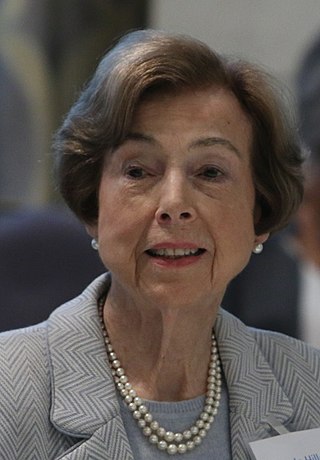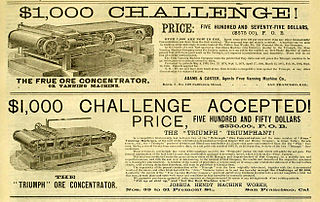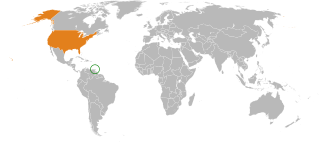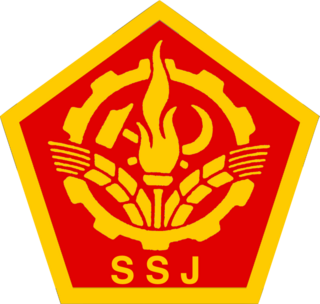Related Research Articles

The United States Department of State (DOS), or simply the State Department, is an executive department of the U.S. federal government responsible for the country's foreign policy and relations. Equivalent to the ministry of foreign affairs of other nations, its primary duties are advising the U.S. president on international relations, administering diplomatic missions, negotiating international treaties and agreements, and representing the U.S. at the United Nations. The department is headquartered in the Harry S Truman Building, a few blocks from the White House, in the Foggy Bottom neighborhood of Washington, D.C.; "Foggy Bottom" is thus sometimes used as a metonym.

Zalmay Mamozy Khalilzad is an American diplomat and foreign policy expert. Khalilzad was U.S. Special Representative for Afghanistan Reconciliation from September 2018 to October 2021. Khailzad was appointed by President George W. Bush to serve as United States Ambassador to the United Nations, serving in the role from 2007 to 2009. Khalilzad was the highest ranking Muslim-American in government at the time he left the position. Prior to this, Khalilzad served in the Bush administration as Ambassador to Afghanistan from 2004 to 2005 and Ambassador to Iraq from 2005 to 2007.
In the United States government, independent agencies are agencies that exist outside the federal executive departments and the Executive Office of the President. In a narrower sense, the term refers only to those independent agencies that, while considered part of the executive branch, have regulatory or rulemaking authority and are insulated from presidential control, usually because the president's power to dismiss the agency head or a member is limited.

The Office of the United States Trade Representative (USTR) is an agency of the United States federal government responsible for developing and promoting American trade policy. Part of the Executive Office of the President, it is headed by the U.S. Trade Representative, a Cabinet-level position that serves as the U.S. President's primary advisor, negotiator, and spokesperson on trade matters. USTR has more than two hundred employees, with offices in Geneva, Switzerland, and Brussels, Belgium.

Carla Anderson Hills is an American lawyer and a public figure. A member of the Republican Party, she previously served as the 5th United States Secretary of Housing and Urban Development under President Gerald Ford from 1975 to 1977 and as the 10th United States Trade Representative under President George H. W. Bush from 1989 to 1993. Hills was the first woman to hold each of those posts, the third woman ever to serve in a presidential cabinet, and the first appointed to both cabinet and cabinet-rank positions.
The Harmonized Tariff Schedule of the United States (HTSUS), also referred to as the Harmonized Tariff Schedule of the United States Annotated (HTSA), is the primary resource for determining tariff classifications for goods imported into the United States. It can also be used in place of Schedule B for classifying goods exported from the United States to foreign countries. The Harmonized Tariff Schedule classifies a good based on its name, use, and/or the material used in its construction and assigns it a ten-digit classification code number, and there are over 17,000 unique classification code numbers. Although the U.S. International Trade Commission publishes and maintains the Schedule in its various forms, U.S. Customs and Border Protection is the only agency that can provide legally binding advice or rulings on classification of imports.
The Eli Broad College of Business is the business college at Michigan State University. The college has programs in accounting, finance, human resource management, management, marketing, supply chain management, and hospitality business, which is an independent, industry-specific school within the Broad College. This independent, industry-specific school has 800 admitted undergraduate students and 36 graduate students not included in the college's totals.

Donald Leroy Bonker was an American politician. A member of the Democratic Party, he served as a member of the United States House of Representatives from 1975 to 1989, representing Washington's third Congressional district.

In economics, competition is a scenario where different economic firms are in contention to obtain goods that are limited by varying the elements of the marketing mix: price, product, promotion and place. In classical economic thought, competition causes commercial firms to develop new products, services and technologies, which would give consumers greater selection and better products. The greater the selection of a good is in the market, the lower prices for the products typically are, compared to what the price would be if there was no competition (monopoly) or little competition (oligopoly).

The United States Commercial Service (CS) is the trade promotion arm of the U.S. Department of Commerce's International Trade Administration. CS is a part of the U.S. Foreign Service and its commercial officers are diplomats. The CS global network of trade professionals helps thousands of U.S. companies to export goods and services worth billions of dollars every year. CS trade specialists are located throughout the United States, as well as in U.S. embassies and consulates in over 75 countries around the world. The mission of CS is to advance and protect strategic U.S. commercial and economic interests around the world.
The University of Connecticut (UConn) School of Business is the University of Connecticut's graduate and undergraduate public business school. It spans across four campuses, with the main campus located in Storrs, Connecticut.

The Trade Act of 1974 was passed to help industry in the United States become more competitive or phase workers into other industries or occupations.

The Omnibus Trade and Competitiveness Act of 1988 is an act passed by the United States Congress and signed into law by President Ronald Reagan.

The U.S. Trade and Development Agency (USTDA) is an independent agency of the United States government, formed in 1992 to advance economic development and U.S. commercial interests in developing and middle income countries.

Trinidad and Tobago – United States relations are bilateral relations between Trinidad and Tobago and the United States.
The Exon–Florio Amendment50 U.S.C. app 2170 is a law that was enacted by the United States Congress in 1988 to review foreign investment within the United States. The amendment was passed into law under the Omnibus Trade and Competitiveness Act of 1988 and amended Section 721 of Defense Production Act of 1950. All foreign investments that might affect national security may be reviewed and if deemed to pose a threat to security, the President of the United States may block the investment. According to the amendment, the president may block the investment when "there is credible evidence that leads the President to believe that the foreign interest exercising control might take action that threatens to impair the national security." President Reagan delegated the review process to the Committee on Foreign Investment in the United States.

The Metric Conversion Act of 1975 is an Act of Congress that was signed into law by U.S. President Gerald Ford on December 23, 1975. It declared the metric system "the preferred system of weights and measures for United States trade and commerce", but permitted the use of United States customary units in all activities. As Ford's statement on the signing of the act emphasizes, all conversion was to be "completely voluntary". The Act also established the United States Metric Board with representatives from scientific, technical, and educational institutions, as well as state and local governments to plan, coordinate, and educate the U.S. people for the Metrication of the United States.
Currency manipulator is a designation applied by United States government authorities, such as the United States Department of the Treasury, to countries that engage in what is called “unfair currency practices” that give them a trade advantage. Such practices may be currency intervention or monetary policy in which a central bank buys or sells foreign currency in exchange for domestic currency, generally with the intention of influencing the exchange rate and commercial policy. Policymakers may have different reasons for currency intervention, such as controlling inflation, maintaining international competitiveness, or financial stability. In many cases, the central bank weakens its own currency to subsidize exports and raise the price of imports, sometimes by as much as 30-40%, and it is thereby a method of protectionism. Currency manipulation is not necessarily easy to identify and some people have considered quantitative easing to be a form of currency manipulation.

The FRIENDSHIP Act of 1993 was enacted as a law of the United States enhancing prior statutory provisions which govern international relations between the former Republics of the Soviet Union and United States during the Cold War. The Act of Congress reformed United States statutes related to:

The Confederation of Trade Unions of Yugoslavia (SSJ) was a mass organization in SFR Yugoslavia that operated as both a centralized body of trade unions and a socio-political organ of the Yugoslav government. It existed as one of the most powerful organizations within the Socialist Alliance of Working People of Yugoslavia, the popular front of the ruling League of Communists. In addition to assisting in the implementation of the Party's domestic labor programs, the SSJ actively sent labor delegations abroad to other countries, with 190 such delegations having been sent in the year 1959 alone. The organization maintained relations with both Western and Eastern labor unions and represented Yugoslavia at the International Labour Organization.